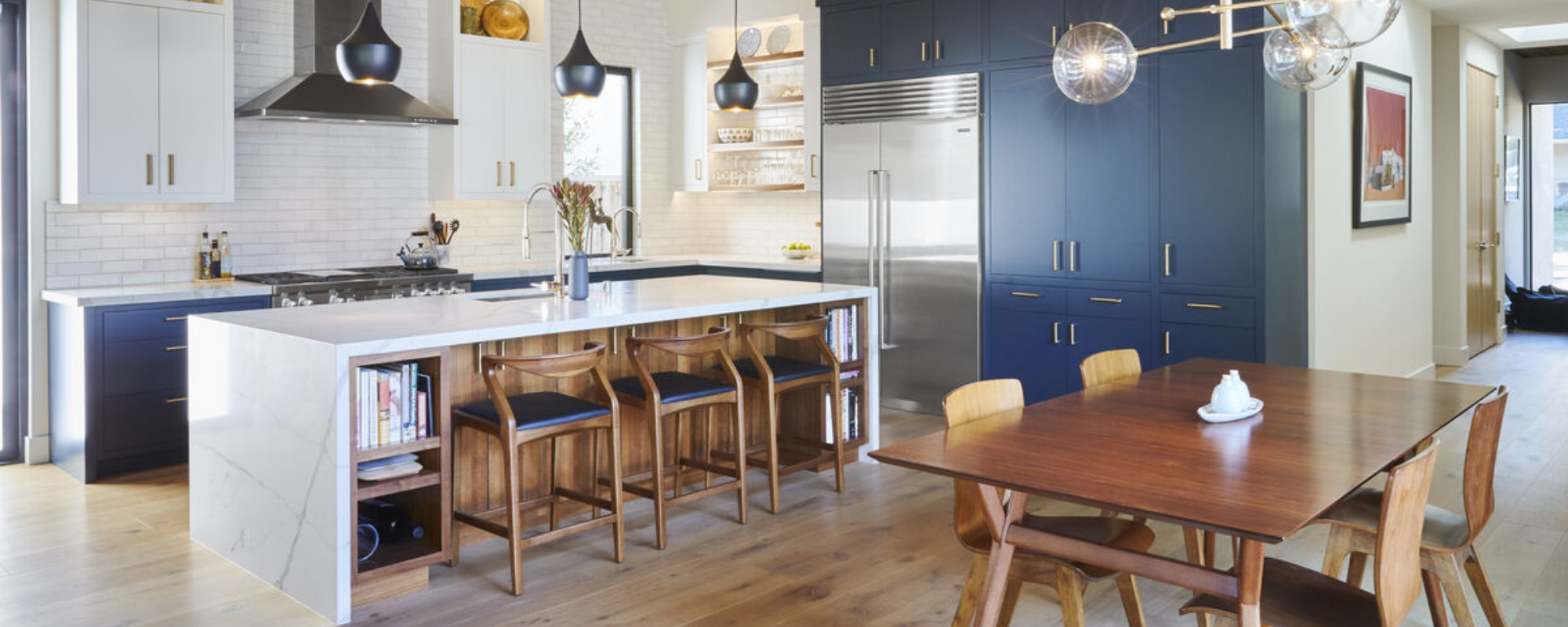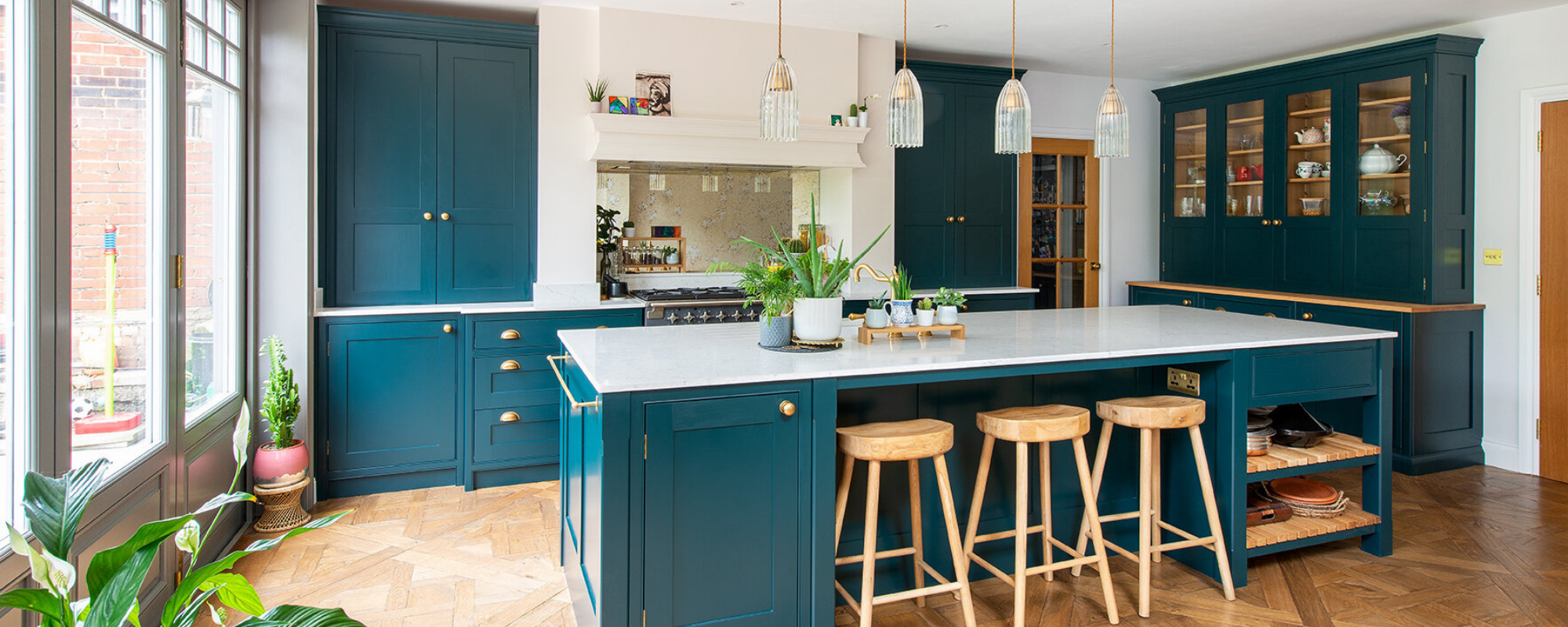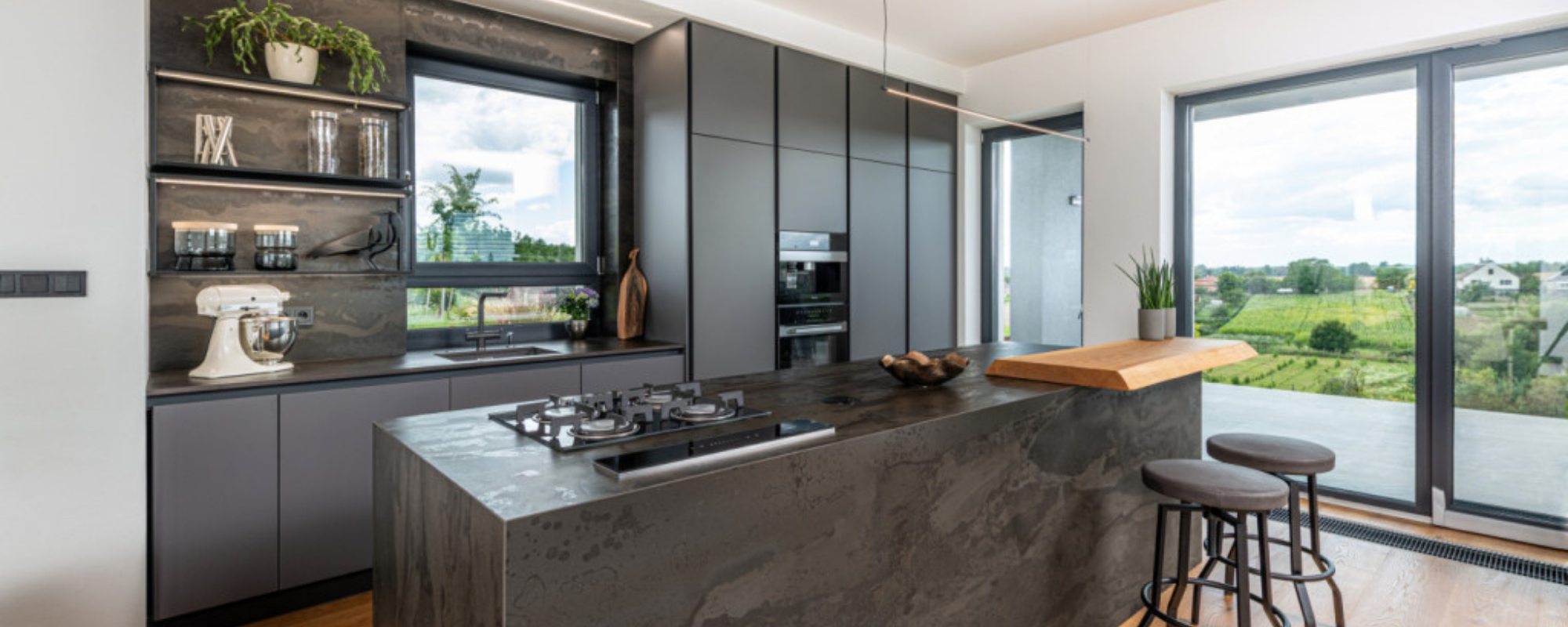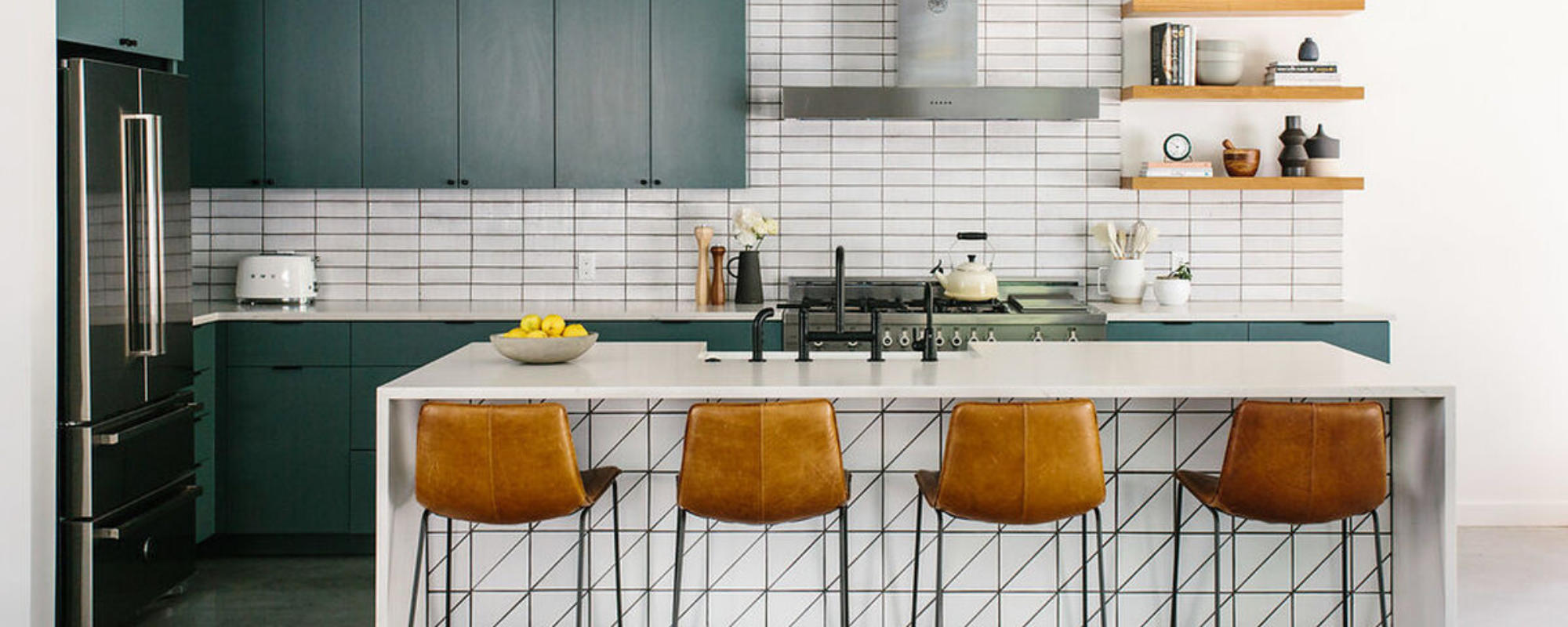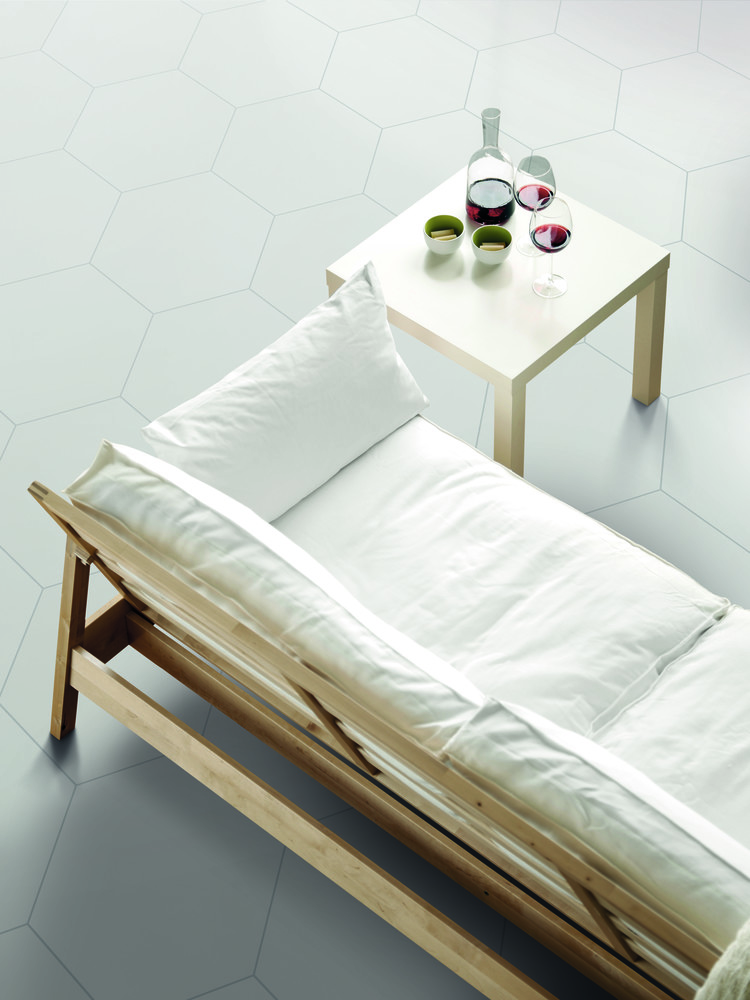Countertops are a major component of your kitchen. Not only do you spend a lot of time working on your countertops, but they also are one of the main focal points of the room. When remodeling your kitchen you want countertops that are both durable and beautiful. You want natural stone countertops.
Now that you’ve realized that natural stone countertops are the best way to go, you need to decide which of the six natural stone countertop options is the right one for you.
The 6 most popular natural stone countertop materials include:
- Granite Countertops
- Quartzite Countertops
- Marble Countertops
- Limestone Countertops
- Soapstone Countertops
- Slate Countertops
1. Granite Countertops
Granite countertops are one of the most popular natural stone countertops. There are many reasons so many homeowners turn to them. Granite is one of the strongest of the natural stones that are used for countertops, making it a great choice in kitchens where the countertops get a great deal of abuse. If you’re an enthusiastic cook, are someone who piles a lot of heavy items on your counters, or who simply worries about chips and scratches, you can’t go wrong with granite. Just don’t slam heavy items against the corners of the granite, since a strong, sharp blow can crack the countertop.
There are 20 different colors of granite you can select from while picking out the countertop you want to have installed in your home. The wide range of colors means you’ll find just the right shade to suit both your personality and your kitchen’s color scheme. Because each slab of granite has a unique pattern, you don’t have to worry about your countertop looking exactly like everyone else’s.
View our granite countertop product page:

Most people love granite countertops, making them a great choice if you have any intention of selling your home in the future. Many buyers will use granite countertops as the deciding factor while choosing between two compelling homes.
Granite countertops are wonderful, but there are drawbacks. The biggest headache connected to granite countertops is keeping them sealed. Granite is strong, but it’s also porous. Unsealed, the pores provide a breeding ground for bacteria. Failing to keep the countertops sealed also leaves them susceptible to stains. Sealing the countertops isn’t difficult, but it’s something you need to remember to do once or twice a year.
Pros: no (or low) visible seams, durable surface, heat-resistant
Cons: must be sealed to resist stains, expensive
2. Quartzite Countertops
Quartzite countertops are primarily made out of quartz, which is created when just the right amount of heat, pressure, and natural chemicals come together. Impurities such as iron, alter the stone’s natural white or gray color. While not as well known as granite or marble, quartzite countertops are starting to gain popularity among interior decorators and are showing up in more new and remodeled homes.
Quartzite resists UV damage, making quartzite a fantastic choice for kitchens that get a great deal of sun exposure. Despite the constant exposure to the sunlight, in twenty years the quartzite will look just as good as it did the day it was installed. Like granite, quartzite is incredibly strong and heat-resistant.
Quartzite isn’t as popular as granite, making it a good choice if you’re trying to turn your kitchen into a unique showpiece that amazes your friends. Most quartzite is cut in a way that makes it appear that the stone’s natural swirls are in motion and appear almost three-dimensional. The patterns are particularly well suited for kitchens that are outfitted with steel appliances and cool colors.

Like granite, quartzite is another porous natural stone that requires regular sealing which protects it from stains and bacteria. The type of sealant used on the countertop can impact its ability to withstand high temperatures so you do have to be careful about the sealant when you’re caring for a section of the countertop that’s next to your stove.
The biggest reason many people turn away from quartzite is the cost. The stone is incredibly strong, too strong for most cutting tools. Shaping it into a countertop requires the use of diamond cutting tools which are expensive. The entire cutting process is time-consuming and can only be done by a skilled professional. The expense of cutting and shaping the quartzite significantly drives the price up. The good news is that quartzite is so lovely, most homeowners feel that the expense is justified.
Pros: extremely durable surface, resistant to heat, scratches, and etching
Cons: can be damaged by sharp objects, sealing is required, limited color choices
3. Marble Countertops
Marble is a type of natural stone that’s created when limestone is subjected to intense heat and pressure. Centuries of the world’s most famous sculptures have been drawn to marble. The same soft glow and light veining that attracts artists, also appeals to interior designers, causing them to order massive quantities of marble countertops.
If you’re thinking that marble countertops are the height of luxury and therefore will be out of your budget, you’re not alone. Lots of people have the same misconception. The truth is that of your six natural stone countertop options, marble is one of the most affordable. The main reason for this is that marble is a great deal softer than the other natural stones. Softer stone means it’s easier to cut and shape which significantly lowers your purchase price. Improved extraction and shipping have further lowered the cost, making this natural stone countertop option budget-friendly.
While all-natural stone countertops look amazing, there’s something just a little extra special about marble. It has a soft glow that adds a touch of warmth and class to any room it’s installed in.

Because marble is so soft and easy to work with, it’s possible to have carvings and designs worked into your countertops, something that isn’t possible with other types of natural stone. Working designs into the marble is a great way to add a touch of class to your home.
The biggest drawback to marble countertops is staining. This is bad news for enthusiastic chefs who tend to splash and spill things onto their countertops. A good sealant goes a long way towards preventing stains, provided you’re diligent about making sure the countertops are resealed every few months. Laying something down on your countertops while cooking is also a good precaution against staining. Be prepared to wipe up anything that does spill onto the marble.
Repairing marble countertops, particularly slab counters, is a problem. In some cases, the only option is replacing the entire countertop. The good news is that in many situations, the damaged piece can be removed and a new marble tile inserted.
Pros: durable surface, striking natural patterns, heat resistant
Cons: high-maintenance, needs repeated sealing, expensive
4. Limestone Countertops
Incorporating limestone countertops into your home is like adding a little piece of planetary history to your life. The limestone used in your countertops was created by the calcium carbonate of shells and bits of skeletons of ocean life. The shells and bones build up on the ocean floors and eventually harden into limestone.
One of the great things about limestone is that it’s affordable enough that you can use if for both your countertops and flooring, which creates a lovely consistency in both kitchens and bathrooms. The stone looks particularly appealing when incorporated into homes that have been decorated with a Tuscan or Southwestern vibe. The strongest limestone countertops come from limestone that was quarried in France.
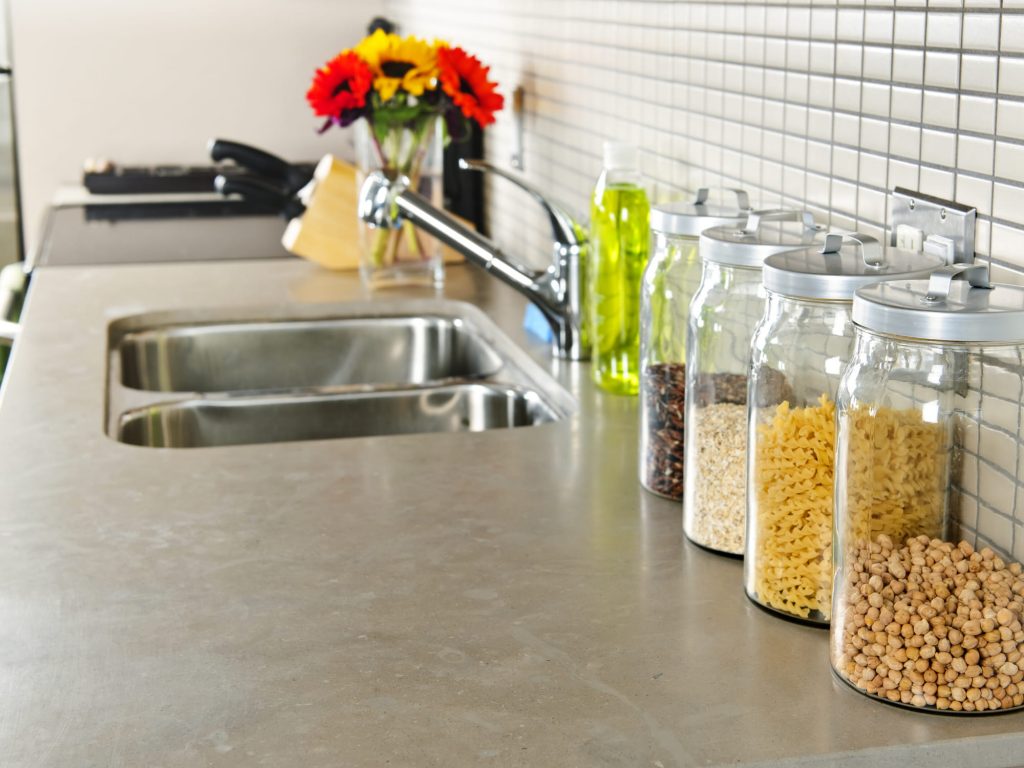
Limestone countertops are durable to withstand a lifetime of banging from pots and pans, yet it’s surprisingly sensitive to scratches and cuts, something you’ll quickly discover if you ever drop a knife on your countertop. Since limestone reacts badly to acids, you have to be diligent about the type of cleansers you use. You should never use vinegar or lemon juice while cleaning your limestone countertops.
Pros: elegant beauty, heat resistant, affordable
Cons: needs maintenance, prone to scratches and staining
5. Soapstone Countertops
Long before Europeans settled in North America, Native Americans were quarrying soapstone and using it to make pots, utensils, and jewelry. Today, natural stone is a popular countertop choice.
One of the great things about soapstone is that it is less likely to crack than other stone countertops. Soapstone is soft and easily cut, which makes it affordable. It’s heat-resistant and very attractive. At this point it’s also not commonly found in many homes, making it a great choice if you’re seeking a unique look.
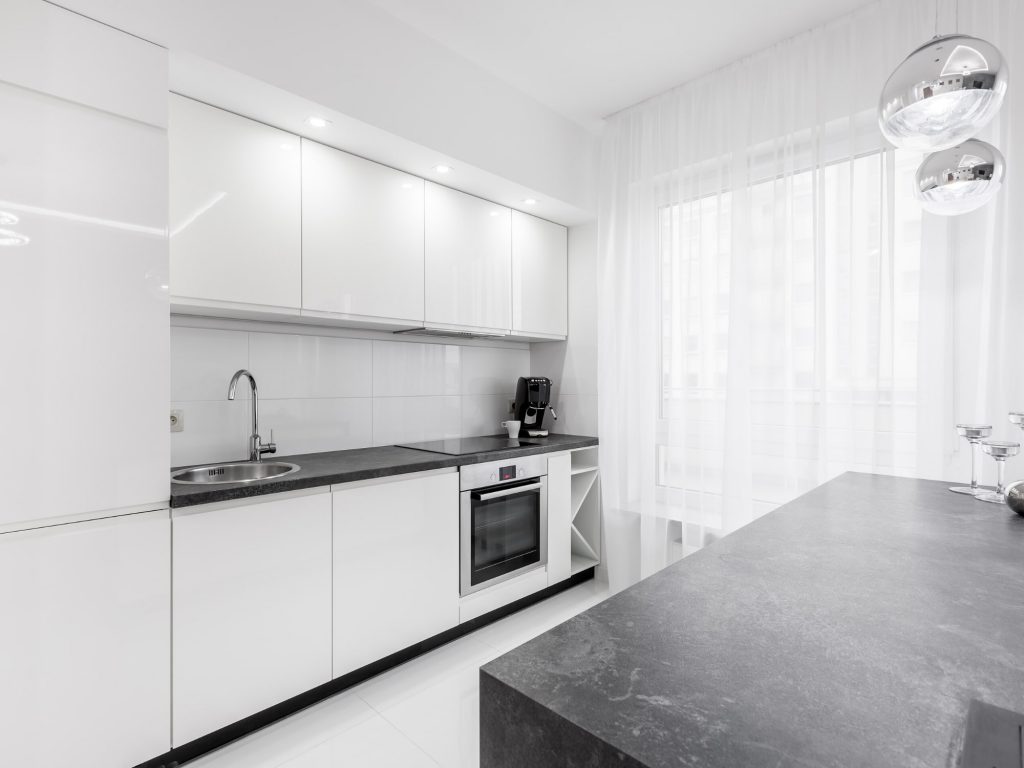
The biggest disadvantage of soapstone countertops is that soapstone simply isn’t as durable as the other natural stones. If treated kindly it will provide you with several decades of use, but it won’t last as long if heavy items are constantly getting dropped on it. The stone doesn’t crack, but it will dent. It can also be difficult to match two different soapstone countertops. There is also a limited number of color options when you select soapstone for your countertops.
Pros: easy to clean, heat resistant, unique look, environmentally friendly
Cons: prone to scratches and chips, limited color choices, regular maintenance
6. Slate Countertops
Slate is commonly associated with the old, handheld chalkboards students once used for school. Today, slate, which is created from foliated metamorphic rock, is a favored natural stone for both shingles and countertops.
There are several advantages connected to slate countertops. Like all the natural stones, it’s heat-resistant, it’s durable, and it’s attractive. Slate looks fantastic in modern kitchen designs, particularly when paired with copper, brass, and chrome fixtures and appliances. Slate is a fantastic choice if you like the idea of a natural stone countertop but want something more budget-friendly than granite or marble. Slate is an excellent choice if you’re looking for a countertop that resists both stains and scratches.

One of the biggest disadvantages with slate is there aren’t a lot of options when it comes to appearance. Dark is the only choice and it doesn’t suit everyone’s taste. This can be especially challenging if you’re planning on putting your home on the market.
Pros: attractive, heat resistant, durable surface, moisture resistant
Cons: limited color choices, corners can begin to be brittle overtime,
Consult With the Experts of Northern Virginia
Deciding to remodel your home and install new natural stone countertops is a big decision. Don’t hesitate to contact us at A&S Home Interiors for a free estimate on your kitchen remodel. Visit our Lorton Virginia countertop showroom in the Northern Virginia and DC area today! To schedule an appointment, call us at (703) 783-2758. We look forward to working with you soon.


